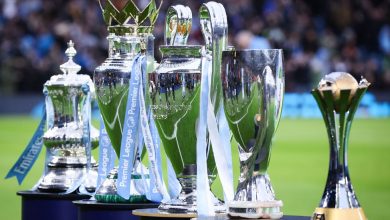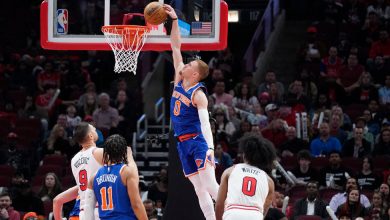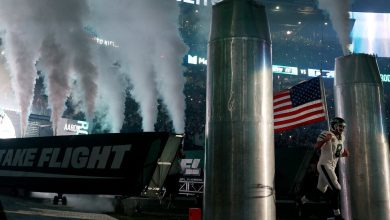He Helped St. Louis Land the Rams. He Squeezed the N.F.L. When They Left.

The ultimate fix-it man in his native St. Louis, Bob Blitz was once a key facilitator for the N.F.L.: He helped lure the Rams to St. Louis from Anaheim in 1995 and represented the operators of the stadium where the team played for 21 years. When the lease came up, he was asked to co-chair a task force to keep the Rams from leaving town.
But while Blitz and others amassed the financial commitments to build a new riverfront stadium, Rams owner E. Stanley Kroenke broke St. Louis residents’ hearts by sniffing out a new location in California. When the league gave Kroenke the greenlight to move, Blitz fought it in the way most disheartened Rams fans could only wish: in court.
For the past four years, the country’s most powerful league has found itself mired in a legal cage match with the city, the county of St. Louis and the operators of the Rams’ former stadium over the departure of the franchise, which left for Los Angeles in 2016. With a trial looming, the N.F.L. and Kroenke lost a foreboding number of motions that led the league to settle the case last week for $790 million, in a move that could create a precedent-setting legal road map for other spurned cities.
At the center of the fight over whether the league bent its own relocation guidelines to streamline the Rams’ exit, and deceived St. Louis in the process, stood Blitz.
Like most inside men, Blitz is an enigma, even in his hometown where high school affiliation and country club memberships are calling cards among the area’s elite. Outside of his day job, the extravagant Christmas party he throws each year at a fancy steakhouse and watching the occasional local wrestling tournament, Blitz is rarely seen on the social circuit in town.
Blitz, other lawyers involved in the case, and former officials who worked to keep the Rams in St. Louis declined interview requests, citing the litigation and a gag order. Blitz also did not respond to interview requests once the case had been settled.
The N.F.L. declined to comment for this story.
Blitz, a longtime plaintiffs lawyer, typically represents workers, unions and consumers, not entire cities. But he’s earned a reputation for doggedness even though he does not crow about his victories in front of the television cameras.
He has also been involved with sports since his youth. Blitz played football and baseball and wrestled at University City High School. His father, Morris Blitz, was a school superintendent who introduced wrestling to students and in 1977 was part of the inaugural class inducted into the Missouri Wrestling Hall of Fame.
Morris Blitz taught that successful wrestling revolved around earning leverage, and that the little guy is just as important as the big guy.
They are characteristics the N.F.L. has learned were transferred to Bob Blitz, first as a friend and now as a foe.
The city of St. Louis, the county and the St. Louis Regional Convention and Sports Complex Authority — which operates the team’s former stadium and spent more than $17 million on the failed effort to keep the Rams in the city — accused the league and owners in 2017 of violating their own relocation guidelines when they voted to return the franchise to California, despite St. Louis coming up with plans for a new, $1.1 billion stadium.
“I’m going to be polite and just say that their proposal and the facts contained in there are inaccurate,” Blitz told Missouri Lawyers Media in 2016. “And that’s the polite word. If I were just a fan, I’d be irate.”
The legal team representing the plaintiffs featured lawyers from Dowd Bennett, one of the city’s most prominent firms that included Jay Nixon, the former governor of Missouri, who asked Blitz and Dave Peacock, a former top executive at Anheuser-Busch, to lead the task force to keep the team in the state.
“In spite of his presidential look based on the pictures that I’ve seen of him on the internet, he could walk into my office right now and I wouldn’t know who he is,” Eric Banks, a former St. Louis city counselor, said of Blitz.
Those who have worked with him describe him as a workaholic who gains energy from drawn-out courtroom battles against larger foes.
“Bulldog doesn’t really capture Bob,” said Catherine Hanaway, a former U.S. attorney and Missouri House Speaker, who has opposed Blitz in court. “He’s a bull. He is a physically strong, imposing, aggressive lawyer and the other adjective I’d use to describe him is connected.”
Hanaway and others say he works behind the scenes to bridge big gaps. They point to his work on the task force in 2014 and 2015, when he persuaded an array of public officials in a conservative state to pass financing for a new stadium.
“He plays a very insider’s game,” Hanaway said. “He has close relationships with governors, with mayors, but it’s a real trusted adviser kind of a relationship and if you have that with those kinds of decision makers, you also have to be somewhat discreet or they’re not going to trust you.”
Blitz’s deep knowledge of the Rams’ tenure in St. Louis, and the team’s maneuvering that led to its departure, made him an unusual weapon for the city as the N.F.L. embarked on an uncharacteristic losing streak after batting down a similar lawsuit filed by the city of Oakland in federal court against the Raiders after that team relocated to Las Vegas.
After the league lost requests to have the case thrown out or moved into private arbitration, which would have prevented dragging N.F.L. business into the public record, it sought to have the trial transferred out of St. Louis to a more neutral jurisdiction. That request was also denied.
In July, St. Louis Circuit Judge Christopher McGraugh ruled that several owners had to disclose financial information about their teams because they could be personally liable for punitive damages, a decision that did not rest well with the oligarchs.
Last month, McGraugh fined Kansas City Chiefs owner Clark Hunt, New York Giants owner John Mara, Dallas Cowboys owner Jerry Jones and New England Patriots owner Robert Kraft all between $5,000 and $8,000 and threatened to hold them in contempt for failing to comply with his ruling.
The ruling that the N.F.L. did win may have ultimately been a tactical blunder. The league successfully petitioned to have Blitz removed from the case as a lawyer, but the change meant that he could have been called as a witness at trial, with his wealth of insider’s knowledge on full display from the witness chair.
Blitz had already made his impact on the case as a litigator.
Acutely aware of the league’s inner workings and personally invested — and presumably irate over their decision-making — he deposed some of the league’s most influential kingmakers, including Kroenke.
The two Missouri natives faced off, each born in 1947, and each having attended the University of Missouri. The one accused of turning his back on the city answered to the other, who was charged with extracting some revenge.
During their exchange, Blitz asked Kroenke if he had spoken to other owners about relocating to Los Angeles as early as 2013, a key factor in determining whether the league had negotiated in good faith with the St. Louis bundlers who were putting together a stadium proposal.
“Before October of 2013, did I ever talk to anyone, any owner about the opportunity or the option to move to L.A.?” Kroenke said. “I think I probably did.”
Kroenke said he did not recall how many team owners he had spoken with about a potential move.
In a separate deposition in October 2020, Goodell was pressed repeatedly on the question at the heart of the lawsuit: Did the N.F.L.’s team owners ignore their own relocation guidelines when they voted to allow the Rams to move? Goodell gave elusive responses on whether the owners had considered each of 12 predetermined factors or if they’d voted merely because a Los Angeles deal was available.
“And I will say it again that I think the ownership was very responsible in considering all of the various factors and really understanding the key issues and ultimately made a decision which is in the best interest of the N.F.L.,” Goodell said, according to a partial transcript of the deposition.
The realization that an answer like that was unlikely to satisfy a jury of Missouri residents, combined with the prospect of several N.F.L. owners being called to testify, made settling the case a more pragmatic option than opening a trial on Jan. 10, just weeks before the Super Bowl is scheduled to be played at SoFi Stadium, the splashy $5 billion venue in Inglewood, Calif., that Kroenke built after moving the team west.
In deciding to settle for $790 million, the N.F.L. closed its responsibility to Blitz and a city that has lost not just the Rams, but also the Cardinals, who left for Arizona after the 1987 season. But the league provided precedent for other scorned cities.
“The host cities may actually begin to gain leverage back,” said Daniel Wallach, a sports and gambling lawyer who has tracked the case.
For the N.F.L., the agreement ensures that a public rendering won’t happen and keeps private the juicy details of league business contained in the many documents pertaining to the lawsuit. It also ensures that the backbiting between team owners stays in house.
Before the league opted to settle, Kroenke and the other team owners appeared to be at each others’ throats as he, according to multiple news outlets, attempted to free himself of the indemnification agreement that held him liable for legal expenses and potential damages related to relocation litigation.
Now, Kroenke may have to pay for most or all of the settlement.



